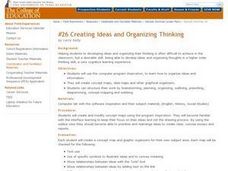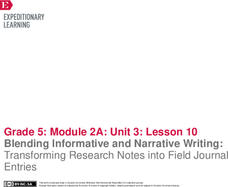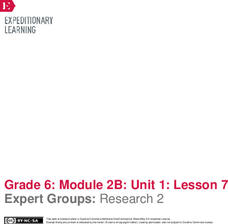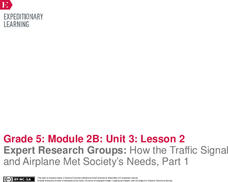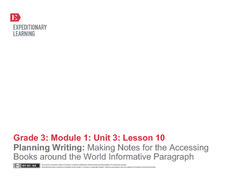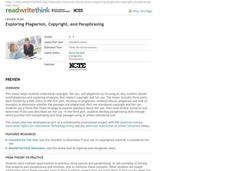Curated OER
How Can We Organize Study of a Given Place?
Seventh graders embark in discovery of basic facts about an assigned continent and are asked to organize their information into categories. The Five Themes model is taught and students reshuffle their information appropriately.
Curated OER
Creating Ideas and Organizing Thinking
Students examine the concept of developing ideas and organizing their thinking. They create concept maps and graphic organizers using Inspiration software, and develop a concept map for their own subject area.
Curated OER
Organizing One’s Thoughts
Students take a closer look at the organization of written pieces. In this writing skills instructional activity, students examine transitions, repetition, parallelism, and other organizational patterns in writing.
Curated OER
Reading Comprehension: History of the Periodic Table
Although the article that launches this lesson is about the history of the Periodic Table, the objective is reading comprehension. Using the eight-page informational text, learners answer five comprehension questions and craft one essay....
Melissa Institute for Violence Prevention and Treatment
Concept Muraling
Concept muraling helps learners improve their comprehension of a text by giving them a way to organize their understanding of the key concepts in that text. Introduce readers to this process with a carefully scaffolded instructional...
EngageNY
Blending Informative and Narrative Writing: Transforming Research Notes into Field Journal Entries
The fabulous four. Scholars learn the four key components for creating an excellent journal entry. They then work to create a journal entry rubric and participate in a mini lesson about organizing and outlining journal entries.
Prestwick House
Writing Arguments in Response to Nonfiction
Emotional appeal or argument? That is the question. An informative instructional activity helps your class recognize the difference between a logical argument and an emotional appeal and learn how to craft an argumentative response....
EngageNY
Expert Groups: Research 2
Continue on. Scholars continue the research they began in their expert groups in lesson six. They read text and task cards from their research folders and share what they have gathered in research thus far. Individuals then spend the...
EngageNY
World Cafe: Analyzing Sojourner Truth’s “Ain’t I a Woman?”
May I take your order? Scholars read "Ain't I a Woman" and participate in a World Cafe. They work in small groups to discuss text-related questions and then complete a Note-Catcher sheet to organize their thoughts. For homework, learners...
EngageNY
Expert Research Groups: How the Traffic Signal and Airplane Met Society’s Needs, Part 1
Where would society be without the TV? Working together, scholars complete an anchor chart about the invention of the television. Additionally, pupils complete vocabulary cards for key terms from the unit and organize them on a metal ring.
EngageNY
Planning Writing: Making Notes for the Accessing Books Around the World Informative Paragraph
Encourage your young writers to thoughtfully plan and organize their work. First, model how this is done and vocalize your thought process as you work. Next, create a class list of strategies that they can use during independent writing...
EngageNY
Planning Content of Informative Consumer Guide: The Issue of Overfishing and Fish Depletion
Let's get organized! Pupils organize the information they have gathered about overfishing into a Quote Sandwich graphic organizer in preparation for their informative consumer guides. Next, they engage in a pair share activity to discuss...
ReadWriteThink
Exploring Plagiarism, Copyright, and Paraphrasing
Plagiarism, copyright, and fair use are the focus of a three-part instructional activity designed to inform scholars of how to properly cite others' work. First, pupils use a KWL chart to begin thinking and discussing plagiarism. They...
Albert Shanker Institute
The March on Washington Logistics Then and Now
I have a dream ... that all pupils will be able to organize a march of their own after learning about how Bayard Rustin organized the 1963 March on Washington for civil rights. Young reformers work collaboratively examining informational...
Literacy Design Collaborative
The Sunflower: The Possibilities and Limitations of Forgiveness
After reading Simon Wiesenthal's The Sunflower, pupils form opinions either for or against forgiveness as well as analyze Wiesenthal's choice about forgiving. Before completing their essays, learners participate in class discussions to...
PBS
Does Art Imitate Life?
Write what you know, sound advice for any writer and something many famous authors are known to have done. Use these materials to explore how Shakespeare's life influenced his plays. This resource is packed with readings, video segments,...
Curated OER
Building Reading Skills: Fluency
Students practice their fluency skills. In this fluency lesson, students read aloud stories to their peers and they help to coach one another on their fluency, pronunciation, phrasing, and inflection. They discuss what makes a good...
Curated OER
Planning a Class Party
Students investigate event planning. In this literacy and communications lesson, students brainstorm food, activity, and guest ideas for a monthly classroom celebration of student birthdays.
Curated OER
How to Study for a Test
Students discuss and write about how to study for a test and create a class test taking manual. They can also choose to write GED questions to become more familiar with test questions.
Curated OER
How Do I Get There? Planning a Safe Route to School
One much-needed skill for young learners is direction giving. Have your class plan and draw a safe route for them to travel from home to school. They will also draw places and items that are in between home and school in order to build a...
Curated OER
Native American Tribes
Have your class learn about Native American tribes in California. They identify five regions where Native Americans lived, discuss the daily life of these people, and conduct research on a particular tribe. Afterward, they create a...
Curated OER
Hands-On Outlining
In order to write an effective outline, children must be able to identify main ideas and supporting details, which is the aim of this fun and kinesthetic activity. The class works on the floor to organize sentence strips prepared by the...
English Enhanced Scope and Sequence
Differentiate between Formal and Informal Language
The Pledge of Allegiance, the Gettysburg Address, the National Anthem, and the Preamble to the Constitution all get close attention in an exercise that asks learners to rewrite these formally-worded documents into informal language....
Curated OER
Applying SQ3R to Texts
After a review of the SQ3R strategy, readers use the provided prompts to respond to a text. The value of this worksheet is in the additional questions that move the learner into higher levels of reasoning.



